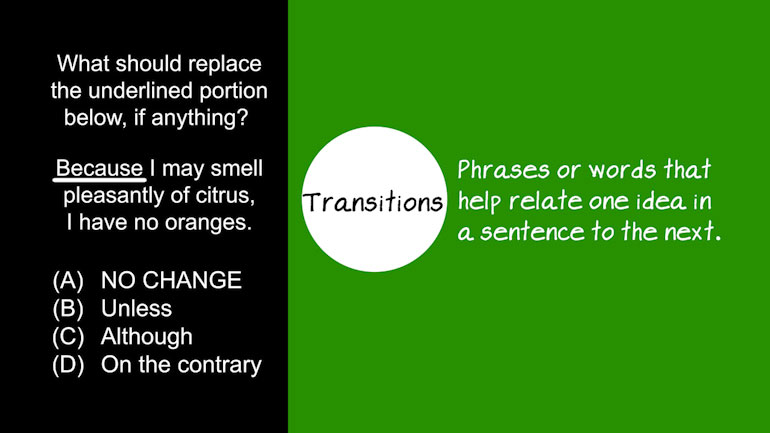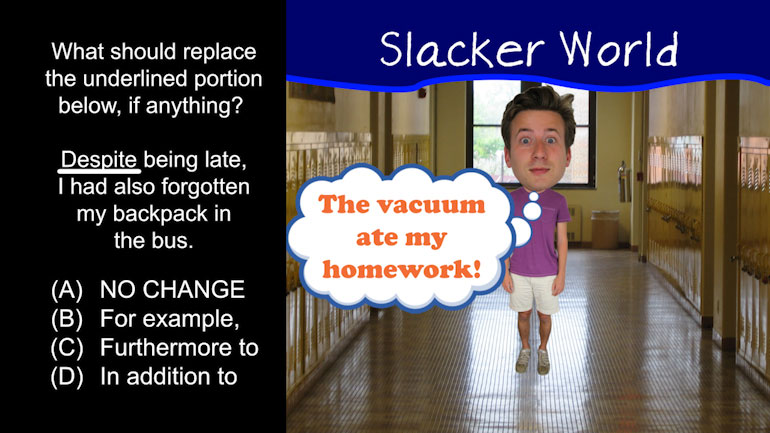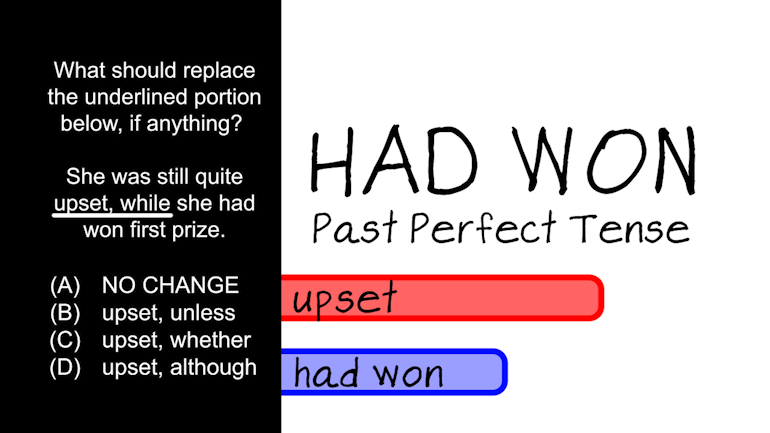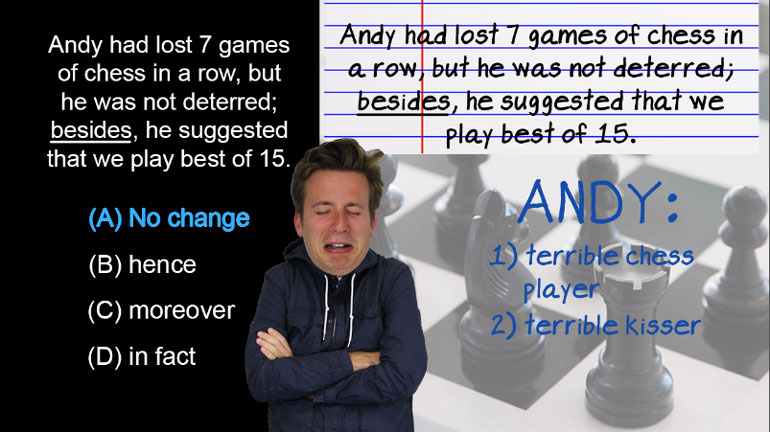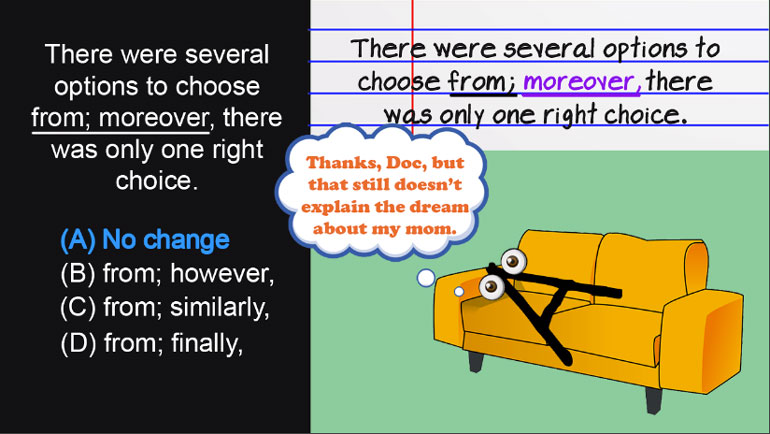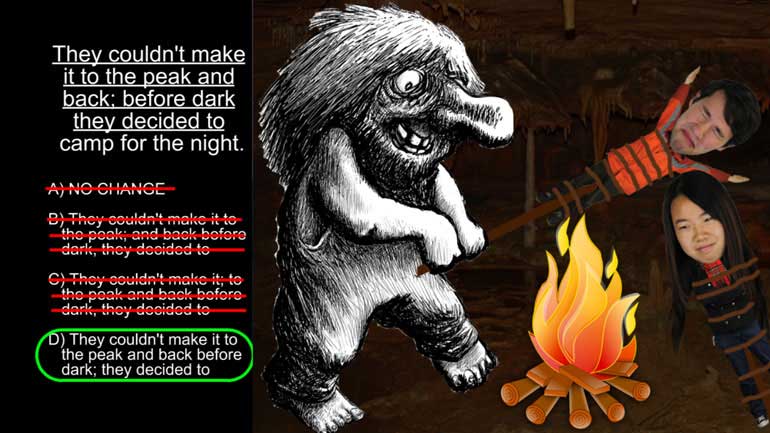ShmoopTube
Where Monty Python meets your 10th grade teacher.
Search Thousands of Shmoop Videos
Playlist ACT® English: Organization 5 videos
ACT English: Organization Drill 1, Problem 1. Which transition works best?
ACT English: Organization Drill 1, Problem 2. Picking the right transition word.
ACT English: Organization Drill 1, Problem 3. Can you find the correct transition?
Transition Words 314 Views
Share It!
Description:
ACT English: Organization Drill 1, Problem 4. Which is the correct transition word?
- Rhetorical Skills / Organization: Sentences and Paragraphs
- Product Type / ACT English
- English I EOC Assessment / Introductory and Concluding Paragraphs
- English I EOC Assessment / Organization
- Essay Revision / Coherence, Organization, and Word Choice
- Essay Revision / Rhetorical Effectiveness and Use of Organization
- Rhetorical Skills / Organization
Transcript
- 00:03
Here's your Shmoop du jour, brought to you by chess. We actually had a really beautiful
- 00:08
chess set once, but we pawned it.
- 00:12
How would you correct the underlined portion of the following sentence, if at all?
- 00:16
Andy had lost 7 games of chess in a row, but he was not deterred; besides, he suggested
- 00:22
that we play best of 15.
Full Transcript
- 00:31
The semicolon signals two independent clauses, so the transition word in question deals with
- 00:35
the relationship between them.
- 00:37
The first clause introduces Andy's feelings about his extensive losses, while the second
- 00:43
clause clarifies Andy's possibly misplaced optimism with an example.
- 00:51
We can easily nix choice (A) because "besides" is never used to provide an example.
- 00:56
Instead, it's used to add one idea to another. An example might be, "Besides being a terrible
- 01:02
chess player, Andy was also a terrible kisser."
- 01:11
Aside from it being kinda redundant, see how the one idea is layered on top of the other?
- 01:15
Of course, this isn't what the sentence is going for at all; therefore, we can say goodbye
- 01:19
to (A).
- 01:20
Choice (C) makes a similar mistake to (A). Like "besides," "moreover" is a transition
- 01:25
used to add more information.
- 01:27
We could say, "Andy was a terrible chess player; moreover, he was a terrible person who liked
- 01:32
to kick puppies," and it would be correct.
- 01:34
Anyway, (C) doesn't help us set up an example, so we can take it out of consideration.
- 01:40
Choice (B) offers "hence" as the solution, but this doesn't do the job either. "Hence"
- 01:45
is used to show how something is caused by something else.
- 01:49
"Andy had never played chess before; hence, he was terrible at it," would be correct.
- 02:01
But again, this sentence is looking for a transition that sets up an example, and establishing
- 02:05
a cause and effect relationship doesn't help.
- 02:08
We dub choice (D) the right answer for its use of "in fact," which is often used to set
- 02:13
up examples.
- 02:14
Here, it correctly sets up the example of just how determined Andy is to win this next
- 02:19
game of chess, despite the odds.
- 02:21
We love Andy's enthusiasm, but don't share his confidence. Let's hope he's not a betting
- 02:26
man...
Related Videos
ACT English: Punctuation Drill 2, Problem 3. Where does the semicolon fit best?
ACT English: Punctuation Drill 2, Problem 2. Where should the semi-colon be placed?
ACT English: Punctuation Drill 3, Problem 1. How should this sentence be changed so that it is grammatically correct?
ACT English: Punctuation Drill 3, Problem 2. How should we properly hyphenate the words in this sentence?
ACT English: Punctuation Drill 3, Problem 4. Which choice best formats this list of items?
